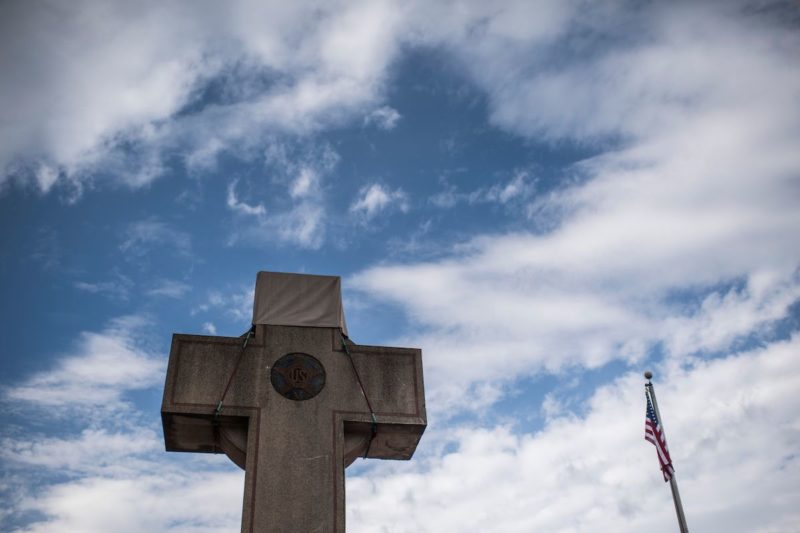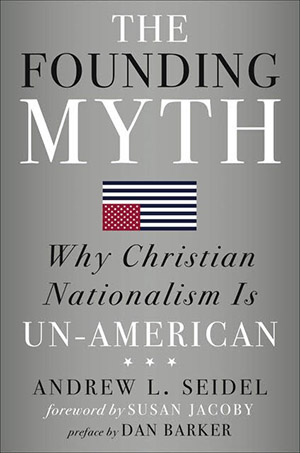SCOTUS Likely to Support Memorial Cross; Should We Even Care?
Every court to decide on such a cross has said that it must come down or be moved to private property, but the conservative Supreme Court majority may rule in its favor. Have we simply forgotten how well separation of church and state has worked?

If you’re Jewish, your service doesn’t matter. If you’re a Hindu who served, we don’t care. If you’re an atheist—even if you’re a hero like Pat Tillman—your sacrifice means nothing.
The Bladensburg cross—which “was re-dedicated in honor and memory of all veterans” decades ago—sends those messages to our military, veterans, and their families. Though some Christians truly do appreciate the problem, conservative Christians are desperate to defend the cross, to retain that message, and, alongside the Trump administration, will be arguing Wednesday at the Supreme Court that the cross does not violate the separation of state and church enshrined in our Constitution.
The 40-ft tall concrete cross is crumbling. The government has spent hundreds of thousands of dollars to repair it over the years, but it’s cracked and on the verge of collapse. In that respect, it’s a bit like the metaphorical wall of separation between church and state. Every court to decide on such a cross has said that it must come down or be moved to private property. That’s because crosses are the quintessential symbol of Christianity; indeed, when the town first approved this one, it voted in favor of a “mammoth cross, a likeness of the Cross of Calvary, as described in the Bible.” But with its new conservative bloc, this Supreme Court seems likely to uphold the “monster calvary cross” and could deal a crippling blow to the wall of separation between state and church.
For many Americans, the response is apathy: Who cares? Why does protecting the separation of state and church matter? Our forefathers looked to history and surveyed the religious violence and torrents of blood spilled when religion blended with government and separated state and church. America invented that separation. Our veterans fight to uphold the principle. [See: Jesus is My Savior… and I Oppose the Bladensburg Cross Memorial – eds.]
Until the “American Experiment” no other nation had sought to protect the ability of its citizens to think freely by separating the government from religion and religion from the government. And it’s worked. Since then, religious violence in America has been comparatively nonexistent. Now, with that history distant and the experiment successful, Americans are taking for granted the fruits of the separation woven into the very fabric of our godless Constitution. The history isn’t fresh, so it’s not persuasive. Maybe it should be, but here a few other reasons why the separation of state and church still matters.
State-church separation unifies our nation. Our country is divided and religion is not a unifying force. Many faiths are mutually exclusive and articles of faith cannot be debated or exchanged, only defended. But our nation is a union; a union of different people and of different states. Unity through diversity is a strength, as America’s de facto original motto, E pluribus unum, “from many, one,” recognized. Religion only unifies adherents, and in a diverse nation like ours, that means it divides us. This cross exemplifies the problem. It’s a Christian symbol that our government is either imposing on all service members, including non-Christians, or that excludes non-Christians who have served from equal memory and honor. Either way, it divides us.
State-church separation promotes equality. Without a strict separation of state and church, one religion will inevitably be favored. Which should it be? Odds are, it won’t be yours. Christianity? Which one? Mormons, Jehovah’s Witnesses, Catholics, evangelicals, Christian Scientists, Pentecostals? How should they divvy up taxpayer money? Who gets the best spots on government property for their symbols? The only fair solution is for the government to remain neutral on religious issues. None is favored, none is disfavored, all are equal.
Divorcing religion from the government does not promote atheism, as some claim. Imagine a football coach at a public high school. He’s a government employee so the separation of state and church requires him to be neutral about religion. He could promote Christianity by telling the students to huddle up and accept Jesus as their savior, effectively forcing religion on a captive audience of other people’s children. Or he could promote atheism by telling them that there is no god and that church and prayer are pointless. (The organization I work for, FFRF, gets between 4,000 and 5,000 state-church complaints every year. We’ve seen plenty of Christian coaches proselytizing nonreligious, Jewish, and other children; we have yet to see an atheist coach promoting atheism.)
But imagine if the coach has the kids huddle up and tells them to go out there and run the option, or a cover two, or just to go out and play their best. That’s religious neutrality. A secular government is not a government that promotes religion or atheism, it’s a neutral government. This is the only fair solution in a diverse society and it’s what our Constitution demands.
Our government has no religious authority. Politicians occupy an office temporarily. The office belongs to us, to “We the People.” That office is given certain limited powers and is prohibited from all else. Politicians cannot use the office to promote their personal business and enrich themselves. Or to fundraise for their campaign. Or a host of other things, including using the power of a public office to promote their personal religion. In the words of Alexander Hamilton, our government, even the president, has “no particle of spiritual jurisdiction.” It is an abuse of power to use an office that belongs to the people to promote one’s personal religion. If you consider yourself a libertarian or a small-government conservative, you too should defend the wall of separation.
Religion benefits from a strong wall of separation. Though nonreligious Americans are the fastest growing demographic, most Americans are still religious. State-church separation is critical for religious independence, credibility, and purity. James Madison put this nicely: “Religion and government will both exist in greater purity the less they are mixed together.” If religion wants to get involved in the government, the government is going to get involved in religion. There is no such thing as a one-way wall. And it’s happening. Courts have upheld “In God We Trust” as the national motto because, they say, it has no religious significance. Imagine if a court said that John 3:16 or praying the rosary had lost, through rote repetition, all religious significance. Religious believers of all stripes should fight to ensure that our courts have no power to secularize religion, but that is only possible as long as we maintain the wall of separation.
The separation also guarantees religious freedom. There is no freedom of religion without a government that is free from religion. True religious freedom can only exist when we divorce the awesome power religion holds over the supposed afterlife, from the power government has in everyday life. In short, a secular government is a prerequisite for religious freedom.
Which brings us back to the Bladensburg cross. Our government maintains a 40-ft tall symbol that proclaims the supremacy of one particular religion. With this cross, our government divides its citizens along religious lines and honors some while ignoring others, creating a favored class and an underclass. With this cross our government is using the power of We the People—all the people—to promote the myths and beliefs of one particular religion. This it cannot do. Nor should any freedom-loving American want to cede this power to our government. We all ought to defend the wall and #HonorThemAll.



